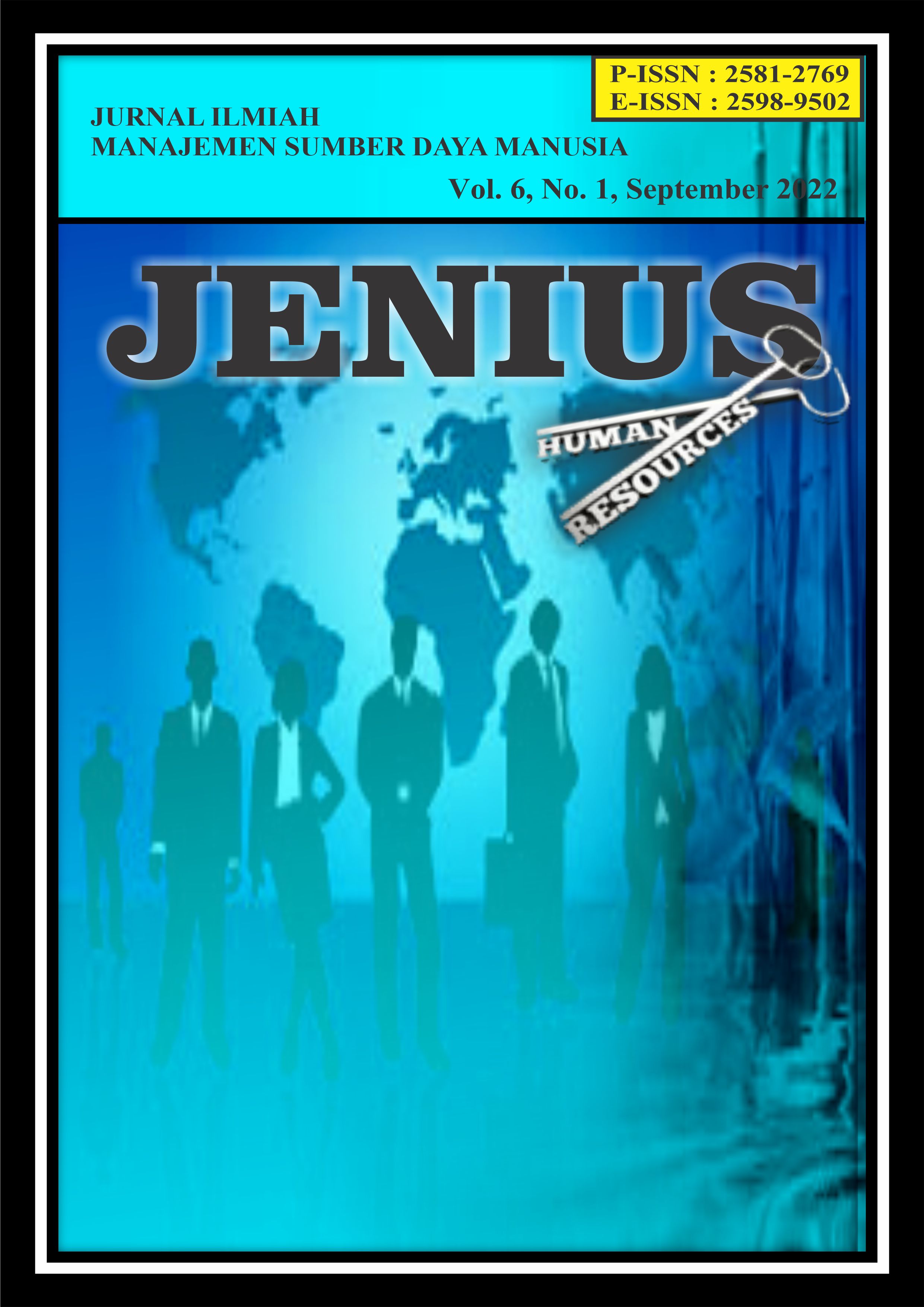The Effect of Leadership, Organizational Commitment and Work Motivation on Employee Performance at The Education Office of Labuhanbatu Utara Regency
DOI:
https://doi.org/10.32493/JJSDM.v6i1.24089Keywords:
Kepemimpinan, Komitmen Organisasi, Motivasi, Kinerja PegawaiAbstract
The success of an agency depends on the performance of employees. Employee performance is influenced by several factors, including leadership, organizational commitment, and motivation. The problem that will be studied in this research is whether there is an influence of leadership, organizational commitment and motivation on employee performance at the Education Office of Labuhanbatu Utara Regency either simultaneously or partially. This study aims to determine the effect of leadership, organizational commitment and motivation on employee performance at the Education Office of Labuhanbatu Utara Regency either simultaneously or partially. The sampling technique used the census method (saturated sample), which took all members of the population into the research sample, amounting to 42 people. The analytical model used in this research is validity and reliability test, classical assumption test, multiple regression analysis, partial hypothesis testing. Simultaneous hypothesis testing and coefficient of determination with the help of the IBM SPSS for windows 23.0 program. The results of the research using SPSS 23, the multiple regression equation Y = 41.997 + 0.385X1 + 0.213X2 + 0.349X3. Test the significance of the regression equation with the F testcount = 5, 115 with a significance value of 0.000 <0.05, which means that simultaneously there is a positive influence between leadership, organizational commitment and motivation on employee performance at the Education Office of Labuhanbatu Utara Regency either simultaneously or partially. The results of the partial test of the leadership variable obtained tcount = 5.550 with a significance value of 0.000 < 0.05, for the organizational commitment variable obtained t count = 3.870 with a significance value of 0.002 < 0.05 and the motivation variable obtained tcount = 4.310 with a significance value of 0.000 < 0.05. The magnitude of the coefficient of influence simultaneously between leadership, organizational commitment and motivation is 51.7%. Based on the results of the study, it can be concluded that leadership, organizational commitment and motivation have a positive influence on employee performance at the Education Office of Labuhanbatu Utara Regency.References
Abbas. Teak. (2017). The Principal's Magnet of Leadership on Teacher Performance. Jakarta: PT. Alex Media Komputindo.
Afandi, P. (2016). Concept & indicator Human Resources Management for Management Research. Yogyakarta: Depublish.
Bastian. (2006). Public Sector Accounting. Yogyakarta: Erlangga.
Bahrum, SP, & Sinaga, W. (2015). The Influence of Leadership and Work Motivation on Employee Performance (Study on Employees of the Batam Bintan Karimun Free Port Free Trade Zone Council). Journal of Accounting, Economics and Business Management, 3(5), 135-141.
Cahyani, Riris Anggun, Ocky Sundari and Johnson Dongoran. (2020). The Effect of Organizational Commitment and Job Satisfaction on Employee Performance (Study on Regional Drinking Water Company (PDAM) Salatiga City). Dewantara Ekobis Journal Vol. 3 No. January 1, 2020.
Darmadi. (2018). Principal Human Resource Management . Yogyakarta: Depublish.
cashmere. (2016). Human Resource Management (Theory and Practice) . Jakarta: Rajawali Press.
Khumaedi, E. (2016). The Influence of Discipline and Work Motivation on Employee Performance at the PT Angkasa PuraI Terminal Operation Center Service. Scientific Journal of Management and Business, 2(1), 66-77.
Kusumah, RM (2017). The Role of Leadership on Work Discipline for Employees in the Production Division of PT. Framasndonesia.ndonesia Building, 16(2), 150-164.
Meidizar, Gilang and Anton Rustono. (2016). The Effect of Motivation on Employee Performance (Case Study at PT. Primarindo Asianfrastructure, Tbk). e-Proceeding of Management : Vol.3, No.2 August 2016 .
Efficacious. (2015). The Future of Islamic Boarding Schools A Study on the Leadership and Management Model of Salaf Islamic Boarding Schools . Yogyakarta: Lkis.
Mustapa, Z., & Maryadi. (2017). Service Leadership Indonesia: Celebes Media Perkasa.
Nata, JL (2017). The Influence of Leadership on Employee Work Discipline at PT. Mandiri Syariah Bank. Islamic Economics and Business, 2, 1-10.
Putro, Sri Raharjo Saptono. (2019). The Influence of Leadership, Organizational Culture and
Communication on Employee Performance (Studies in High Schools Under the Bani Saleh Foundation). Journal of the Gate, Volume 9 No. August 2, 2019.
Rivai, V., H. and Natshir, M. (2014). The Economics Of Education. Jakarta: Gramedia Pustaka Utama.
Saripuddin, J., & Handayani. R. (2017). The Effect of Discipline and Motivation on Employee Performance at PT. Kemasindo Fast Nusantara Medan. Journal of Lecturer at Muhammadiyah University of North Sumatra, 8(10), 419-428.
Setiawan, A. (2013). The Influence of Work Discipline and Motivation on Employee Performance at the Kanjuruhan Regional General Hospital, Malang. Journal of Management, 1(4), 1245-1253
Sugiyono. 2011. Business Research Methods. Bandung: Alphabeta
Sunarsi, D. (2018). Pengaruh Gaya Kepemimpinan dan Disiplin Kerja Terhadap Kinerja Karyawan Pada CV. Usaha Mandiri Jakarta. JENIUS (Jurnal Ilmiah Manajemen Sumber Daya Manusia), 1(2).
Downloads
Published
How to Cite
Issue
Section
License
Copyright (c) 2022 Amir Hasanuddin Siahaan, Syaipul Bahri, Muiz Fauzi Rambe

This work is licensed under a Creative Commons Attribution 4.0 International License.
Authors who publish in this journal agree to the following terms:
The author owns the copyright of the article and assigns to the journal the right of first publication with the work simultaneously licensed under the terms Atribusi 4.0 Internasional (CC BY 4.0)
 which allows others to share the work with acknowledgment of the work's authorship and initial publication in this journal.
which allows others to share the work with acknowledgment of the work's authorship and initial publication in this journal.Authors may enter into separate additional contractual arrangements for the non-exclusive distribution of the published journal version of the work (for example, posting it to an institutional repository or publishing it in a book), with acknowledgment of the work's original publication in this journal.
Authors are permitted and encouraged to post their work online (for example, in institutional repositories or on their websites) before and during the submission process, as this can lead to productive exchanges, as well as earlier and larger citations of published work (See The Effect of Open Access).






.png)

